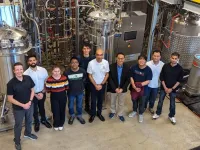(Press-News.org) Information on clinical complications is often missing, while key information on the factors behind medical decision-making, the effectiveness of the lethal drugs used, and the extent of palliative care support isn’t even collected, reveals the review.
Physician assisted suicide as it’s formally known has been legal in the US state of Oregon since 1997 under the Death with Dignity Act.
The legislation allows terminally ill residents over the age of 18 to hasten their death by taking lethal drugs prescribed by a doctor, providing they are capable of making and communicating healthcare decisions, and are likely to die within the next six months.
Since 1998, Oregon Health Authority has published an annual report detailing the demographics of those accessing an assisted death, their diagnoses, health funding status, lethal drugs used, patient concerns, the care provided, clinical complications, and the timings of an assisted death.
Oregon is often cited as a stable example of assisted dying legislation, so the researchers wanted to see if there had been any changes over the 25 years of reporting.
They analysed the data in every annual report from 1998 to 2022, specifically looking at the numbers of patients prescribed lethal drugs under the legislation, their insurance status, reasons for wanting an assisted death, and the qualifying illness.
Some 2454 people died an assisted death during this period. Their average age was 72. In 1998, 24 prescriptions were written for lethal drugs and 16 patients died as a result. On average, the number of lethal drugs prescribed under the legislation increased by 13% each year, with the annual number of assisted deaths rising by 16%. In 2022, 431 prescriptions were written, and 278 patients died as a result.
The proportion of those with private health insurance fell from 65% to 20% over the 25 years; most (80%) had government (Medicare or Medicaid) health insurance in 2022.
In the first 5 years of the legislation, nearly a third (30%) of participants were concerned about being a burden. Since 2017, this has been cited by around half of those opting for an assisted death: 46% in 2022.
Cancer has remained the main qualifying diagnosis, although this fell from an average of 80% in the first 5 years of the legislation to 64% by 2022. But since 2010, various other diagnoses have qualified, including non-terminal illness, such as arthritis, complications from a fall, hernia, and anorexia nervosa.
The length of the doctor-patient relationship reduced over time, the review shows, falling from 18 weeks, on average, in 2010, to 5 weeks in 2022.
And referrals for psychiatric evaluation also steadily declined. In the first 3 years of the legislation doctors requested psychiatric assessment in an average of 28% of cases. By 2003 this had dropped to 5%, and in 2022, just 1% of participants underwent psychiatric evaluation.
The reduction in doctor-patient time “may have made it more difficult to identify treatable factors influencing the wish to die,” suggest the researchers, noting a lack of recent data on how many participants had treatable depression—a factor known to influence a person’s wish to die.
There was also a worrying lack of data on those who didn’t take the lethal drugs they were prescribed, and how they were advised and counselled in the first place, note the researchers.
And information on complications, including those whose death was prolonged or who regained consciousness, was often missing. These data were absent for 206 out of the 278 (74%) assisted deaths in 2022.
In 2022 most (92%) people requesting assisted death were enrolled in hospice care and the average for 1998–2020 was 91%. But there was no information on what services were provided, or by whom, making it difficult to evaluate whether adequate palliative care was received before assisted death, say the researchers.
This is an observational study, and the researchers acknowledge various limitations to their findings, including that data verification wasn’t possible, because Oregon destroys all source records a year after each annual report.
Nor are data collected on how or why assisted dying decisions are made, pre-evaluation or post mortem review of cases, or the details of rejected requests. As physicians aren’t required to be present when lethal drugs are taken, the reports depend on information provided by whoever was present at the time.
“Despite Oregon producing detailed and regular post-death reports of value, there are considerable gaps in the data across US states. Most importantly, there is no monitoring in any form of the quality of the consultation in which the decision was made to prescribe lethal drugs,” conclude the researchers.
“Detailed, prospective studies that include socioeconomic and clinical information are essential to understand fully the changes seen in Oregon [physician assisted suicide] data,” they add.
END
Critical data gaps on doctor assisted deaths in Oregon amid rise in participants
Clinical information often missing; key information on decision-making not even collected
2023-10-04
ELSE PRESS RELEASES FROM THIS DATE:
New robot could help diagnose breast cancer early
2023-10-04
A device has been created that could carry out Clinical Breast Examinations (CBE).
The manipulator, designed by a team at the University of Bristol and based at the Bristol Robotics Laboratory, is able to apply very specific forces over a range similar to forces used by human examiners and can detect lumps using sensor technology at larger depths than before.
This could revolutionise how women monitor their breast health by giving them access to safe electronic CBEs, located in easily accessible places, such as pharmacies and health centres, which provide accurate results.
Precision, repeatability and ...
A prehistoric cosmic airburst preceded the advent of agriculture in the Levant
2023-10-04
Agriculture in Syria started with a bang 12,800 years ago as a fragmented comet slammed into the Earth’s atmosphere. The explosion and subsequent environmental changes forced hunter-gatherers in the prehistoric settlement of Abu Hureyra to adopt agricultural practices to boost their chances for survival.
That’s the assertion made by an international group of scientists in one of four related research papers, all appearing in the journal Science Open: Airbursts and Cratering Impacts. The papers ...
Is universal screening for type 1 diabetes around the corner?
2023-10-04
The the latest data on universal screening for type 1 diabetes (T1D) is reveiwed in a session at this year’s Annual Meeting of the European Association for the Study of Diabetes (EASD) in Hamburg, Germany (2-6 October). The talk will be given by Dr Emily K. Sims, Associate Professor of Pediatrics, Center for Diabetes and Metabolic Diseases, Indiana University School of Medicine, Indianapolis, IN, USA.
Research by various groups has established that individuals with multiple islet autoantibodies (biomarkers showing that the body is attacking and killing its own insulin producing beta cells in ...
Metabolic signature can help predict which smokers will develop type 2 diabetes
2023-10-04
New research being presented at this year’s Annual Meeting of The European Association for the Study of Diabetes (EASD), Hamburg (2-6 Oct) finds that cigarette smoking increases the risk of developing type 2 diabetes in part by affecting a variety of metabolites—small chemicals produced in the processes of metabolism—that circulate in the bloodstream.
The influence of these metabolic changes on diabetes risk appears to be amplified in individuals with genetic susceptibility to type 2 diabetes or insulin resistance.
The analysis of over 93,000 UK Biobank participants also identified a metabolic ...
Metabolically healthy obesity: fact or fiction?
2023-10-04
A session at this year’s Annual Meeting of the European Association for the Study of Diabetes will explore the latest data on the concept of metabolically healthy obesity (MHO) – more commonly known by the public as ‘fat but fit’. Professor Matthias Blüher, University of Leipzig, Leipzig and Helmholtz Center Munich, Germany will explain how we define MHO and ask if it can really be described as healthy.
“Some 15-20% of people living with obesity have none ...
Emergency department screening could detect thousands of undiagnosed prediabetes and diabetes cases, UK study suggests
2023-10-04
The introduction of screening for type 2 diabetes in Accident and Emergency (A&E) departments could uncover thousands of previously undiagnosed cases every year, suggests new research being presented at this year’s Annual Meeting of The European Association for the Study of Diabetes (EASD), Hamburg (2-6 Oct).
“Early diagnosis is the best way to avoid the devastating complications of type 2 diabetes, and offers the best chance of living a long and healthy life”, says Professor Edward Jude, Tameside and Glossop Integrated Care NHS Foundation Trust, UK. “Symptoms of type 2 diabetes may be absent and can be tricky ...
New stem cell-derived islet therapy improves blood sugar control in all treated patients, with three achieving insulin independence
2023-10-04
Six adults with type 1 diabetes (T1D) treated with stem cell-derived islet cells (VX-880) have shown improved blood sugar control with three participants achieving insulin independence, according to new research being presented at this year’s Annual Meeting of The European Association for the Study of Diabetes (EASD), Hamburg (2-6 Oct).
All patients treated with VX-880 have demonstrated improved glycaemic control, as evidenced by elimination of severe hypoglycaemia (low blood sugar), improvements in HbA1c (a measure of long-term sugar levels) and the amount of time their ...
New pipeline makes valuable organic acid from plants — saving money and emissions
2023-10-03
In a breakthrough for environmentally friendly chemical production, researchers at the Center for Advanced Bioenergy and Bioproducts Innovation (CABBI) have developed an economical way to make succinic acid, an important industrial chemical, from sugarcane.
The team of University of Illinois and Princeton University researchers created a cost-effective, end-to-end pipeline for this valuable organic acid by engineering a tough, acid-tolerant yeast as the fermenting agent, avoiding costly steps in downstream processing. Succinic acid is a widely ...
PARMESAN: An AI-based predictive tool to find new treatments for genetic disorders
2023-10-03
To discover new treatments for genetic disorders, scientists need a thorough knowledge of prior literature to determine the best gene/protein targets and the most promising drugs to test. However, biomedical literature is growing at an explosive rate and often contains conflicting information, making it increasingly time-consuming for researchers to conduct a complete and thorough review.
To address this challenge, Cole Deisseroth, a graduate student enrolled in the M.D./Ph.D. program and mentored by Drs. Huda Zoghbi and Zhandong Liu at the Jan and Duncan ...
PPPL awarded $5 million to lead an Energy Earthshot Research Center focused on clean hydrogen
2023-10-03
Lessening the effects of climate change will require a variety of innovations and a lot of ingenuity. Now, a new center led by the U.S. Department of Energy’s (DOE) Princeton Plasma Physics Laboratory (PPPL) will help these efforts by advancing the understanding of plasma-based clean hydrogen production.
PPPL was selected to lead a DOE Energy Earthshot Research Center (EERC) as part of the Hydrogen Shot™, which aims to reduce the cost of hydrogen by 80%. With funding from the DOE’s Office of Science, the EERCs support fundamental ...
LAST 30 PRESS RELEASES:
Boys are more motivated, while girls are more compassionate?
Study identifies opposing roles for IL6 and IL6R in long-term mortality
AI accurately spots medical disorder from privacy-conscious hand images
Transient Pauli blocking for broadband ultrafast optical switching
Political polarization can spur CO2 emissions, stymie climate action
Researchers develop new strategy for improving inverted perovskite solar cells
Yes! The role of YAP and CTGF as potential therapeutic targets for preventing severe liver disease
Pancreatic cancer may begin hiding from the immune system earlier than we thought
Robotic wing inspired by nature delivers leap in underwater stability
A clinical reveals that aniridia causes a progressive loss of corneal sensitivity
Fossil amber reveals the secret lives of Cretaceous ants
Predicting extreme rainfall through novel spatial modeling
The Lancet: First-ever in-utero stem cell therapy for fetal spina bifida repair is safe, study finds
Nanoplastics can interact with Salmonella to affect food safety, study shows
Eric Moore, M.D., elected to Mayo Clinic Board of Trustees
NYU named “research powerhouse” in new analysis
New polymer materials may offer breakthrough solution for hard-to-remove PFAS in water
Biochar can either curb or boost greenhouse gas emissions depending on soil conditions, new study finds
Nanobiochar emerges as a next generation solution for cleaner water, healthier soils, and resilient ecosystems
Study finds more parents saying ‘No’ to vitamin K, putting babies’ brains at risk
Scientists develop new gut health measure that tracks disease
Rice gene discovery could cut fertiliser use while protecting yields
Jumping ‘DNA parasites’ linked to early stages of tumour formation
Ultra-sensitive CAR T cells provide potential strategy to treat solid tumors
Early Neanderthal-Human interbreeding was strongly sex biased
North American bird declines are widespread and accelerating in agricultural hotspots
Researchers recommend strategies for improved genetic privacy legislation
How birds achieve sweet success
More sensitive cell therapy may be a HIT against solid cancers
Scientists map how aging reshapes cells across the entire mammalian body
[Press-News.org] Critical data gaps on doctor assisted deaths in Oregon amid rise in participantsClinical information often missing; key information on decision-making not even collected


